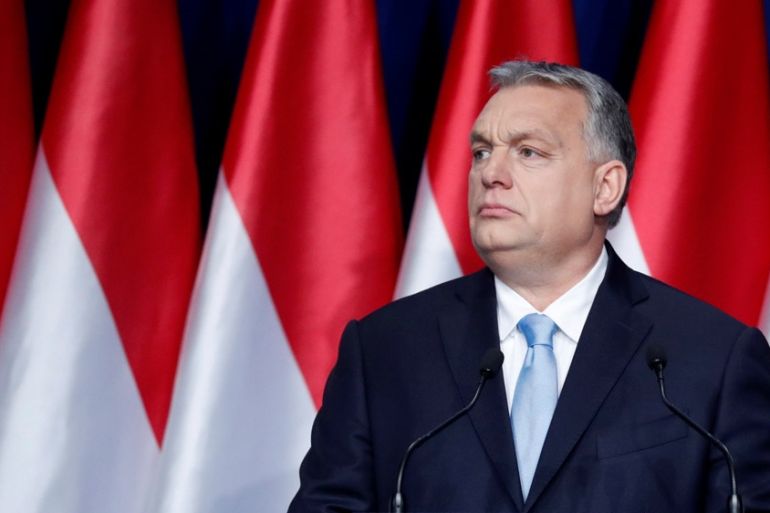EPP suspends Hungary’s far-right Fidesz Party
As part of the suspension, Fidesz will lose all membership privileges including voting rights with immediate effect.

The European Parliament’s centre-right European People’s Party (EPP) has indefinitely suspended Hungary‘s nationalist Fidesz party, in a blow to Prime Minister Viktor Orban just months before European Parliament elections.
The move on Wednesday, which followed more than three hours of heated debate during an assembly in Brussels, saw EEP members vote 190-3 in favour of the measure.
Keep reading
list of 4 itemsGermany’s AfD bans top candidate from EU poll events over Nazi comments
Germany puts alleged leaders of suspected far-right coup plot on trial
German ‘Reichsbuerger’ coup plotters go on trial: Is democracy at stake?
As part of the suspension, Fidesz will lose all membership privileges, including voting rights, effective immediately, EEP President Joseph Daul said in a tweet.
“Fidesz will be suspended with immediate effect until further notice following today’s vote of EEP members,” he wrote.
With the EPP originally expected to vote on whether or not to expel Fidesz from the party, conservative leaders put forward the suspension as a compromise – one aimed at defusing deepening divisions within the party.
Orban, who was in attendance, said he supported the measure and was satisfied with the result.
“We decided that we will not exercise any rights in the EPP and the voters will decide on Fidesz’s place on the political map of Europe,” he told reporters after the vote.
#Fidesz will be suspended with immediate effect and until further notice following today’s vote of EPP members (190 in favour, 3 against). The suspension entails:
▪No attendance at any party meeting
▪No voting rights
▪No right to propose candidates for posts— Joseph Daul (@JosephDaul) March 20, 2019
Comments from the leader of Hungary came hours after his chief of staff, Gergely Gulyas, said any suspension would result in Fidesz withdrawing from the EPP.
Currently, Fidesz makes up a small but important part of the group and is expected to pick up more seats in the May election.
At odds with Brussels
Since taking power in 2010, Orban has been a source of angst for Brussels both for his vocal criticism of the European Union (EU) leadership and his increasingly autocratic policies at home. Since winning a parliamentary supermajority, he has used an anti-migrant platform to bolster an aggressive campaign against independent media, while heavily restricting the role of civil society groups.
As a result of Orban’s actions, the United States-based nonprofit Freedom House last month downgraded Hungary’s status as a free nation to “partly free”.
Rights groups said Wednesday’s decision was nothing more than a politically motivated half-measure.
“Suspend[ing] Fidesz is an admission that something is deeply wrong in its rule-of-law accord, but it’s also a window-dressing compromise,” Philippe Dam, advocacy director for Europe and Central Asia at Human Rights Watch, told Al Jazeera.
“In reality, Viktor Orban has stopped adhering to EPP democratic principles for years. It’s time for the EPP to clarify its stance on EU values and exclude Fidesz.”
![Immigration has become a flashpoint in tense EU-Hungarian relations [File: Eric Vidal/Reuters]](/wp-content/uploads/2019/03/b4e2c854e24445a88e42cf9f983a5008_18.jpeg)
While the EPP has often expressed dismay with Orban’s tactics, a recent media campaign attacking European Commission President Jean-Claude Juncker appears to have been the final straw.
Plastered throughout Hungary were government-funded posters depicting Juncker as a puppet of George Soros, a US-Hungarian billionaire philanthropist.
The banners accused the pair of launching experimental immigration projects with African countries, including mandatory settlement quotas and reduced financial assistance for countries opposed to migration.
As part of the conditions for restoring Fidesz’s membership status, the EPP is demanding the removal of those posters and other material associated with what it calls a “fake news campaign”, according to a draft of the emergency resolution.
“This is a very hard step backwards for Orban and [his participation in] the EU seems to be something very important for him,” said Gabor Polyak, director of the Budapest-based Mertek Media Monitor.
“He did not want this.”